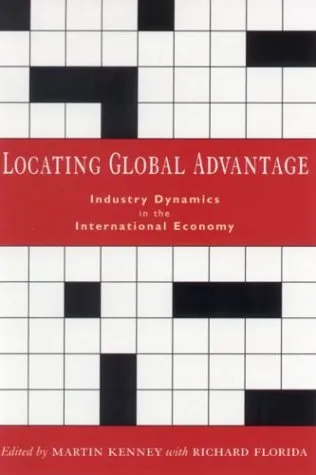Locating Global Advantage: Industry Dynamics in the International Economy
4.0
Reviews from our users

You Can Ask your questions from this book's AI after Login
Each download or ask from book AI costs 2 points. To earn more free points, please visit the Points Guide Page and complete some valuable actions.Introduction to 'Locating Global Advantage: Industry Dynamics in the International Economy'
The global economy has undergone a monumental transformation in recent decades, marked by the rapid globalization of industries, the decentralization of production, and the emergence of new technological powerhouses. In their seminal work, Locating Global Advantage: Industry Dynamics in the International Economy, Martin Kenney and Richard Florida delve into the intricate dynamics underpinning globalization, exploring how industries and regions adapt and thrive in an ever-connected world. This book offers a powerful framework for understanding the competitive advantages of different geographic regions within specific industries. Through meticulous research and case studies, the authors illuminate the fundamental forces reshaping the international economy and provide insights into the strategies businesses, policymakers, and individuals can employ to navigate these changes.
Detailed Summary of the Book
The primary premise of Locating Global Advantage lies in examining how and why industries succeed in specific locations, driven by a symbiotic relationship between local resources, global connections, and innovation capabilities. Martin Kenney and Richard Florida explore the interplay between skilled labor, capital, infrastructure, and policy in shaping globally significant industrial clusters. From Silicon Valley to Shenzhen, they illustrate how certain regions capitalize on their unique strengths to emerge as global leaders in their respective markets.
At the heart of this book is its critical analysis of regional specialization. The authors argue that contrary to the belief in the "death of distance," physical and cultural proximity remains pivotal for sustaining competitive advantage. They highlight how technologies such as broadband networks, coupled with economic globalization, can foster both convergence and divergence in economic productivity across regions. The book dissects case studies from the IT, biotech, and manufacturing industries, showing how specific geographic regions evolve, adapt, and innovate within the global economic landscape.
Another core theme is the role of governments, public policies, and institutions. Kenney and Florida emphasize that regions with thoughtful policies designed to foster innovation, invest in education, and build infrastructure gain sustainable competitive advantages in the global economy. In contrast, those that fail to integrate global opportunities or nurture local assets may find themselves falling behind.
Key Takeaways
- Globalization is not a "flat" process; geographic clustering still matters for industries seeking a competitive edge.
- Regions succeed through a combination of local factors, including skilled labor markets, entrepreneurial cultures, and institutional support.
- Technological advancements, such as the digital revolution, have both integrated and fragmented global industries, creating new opportunities and challenges.
- Government policies play a crucial role in enabling regions to either harness global advantages or fall behind.
- Success in the global economy depends on the ability to integrate local resources with global networks effectively.
Famous Quotes from the Book
"The advantage of place still matters, even in a world seemingly flattened by technology and connectivity."
"Regions that embrace innovation and cultivate networks of learning and collaboration hold the keys to global advantage."
“Far from erasing geographical distinctions, the global economy amplifies the importance of location, making the localization of knowledge crucial for success.”
Why This Book Matters
As the world becomes increasingly interconnected, understanding the dynamics of globalization is no longer optional—it’s essential. This book provides a framework for decoding the complex matrix of factors that make certain regions hubs of innovation and growth while others lag behind. It highlights the critical role geographical location, government strategy, and regional collaboration play in building competitive industries.
The insights offered by Kenney and Florida remain highly relevant in today’s dynamic world economy. As businesses grapple with supply chain realignment, technological disruption, and geopolitical shifts, this book serves as a guide for navigating these challenges. Policymakers, entrepreneurs, and academics alike will find its analysis indispensable in shaping strategies that create and sustain economic advantage in an ever-evolving landscape.
In addition, this book’s exploration of the global-local nexus provides valuable lessons for anyone seeking to understand how the global economy functions and where future opportunities might lie. Whether you’re a business leader exploring regional investments or a researcher studying globalization, Locating Global Advantage offers a compelling, evidence-backed narrative to guide your efforts.
Free Direct Download
You Can Download this book after Login
Accessing books through legal platforms and public libraries not only supports the rights of authors and publishers but also contributes to the sustainability of reading culture. Before downloading, please take a moment to consider these options.
Find this book on other platforms:
WorldCat helps you find books in libraries worldwide.
See ratings, reviews, and discussions on Goodreads.
Find and buy rare or used books on AbeBooks.
1159
بازدید4.0
امتیاز50
نظر98%
رضایتReviews:
4.0
Based on 0 users review
"کیفیت چاپ عالی بود، خیلی راضیام"


